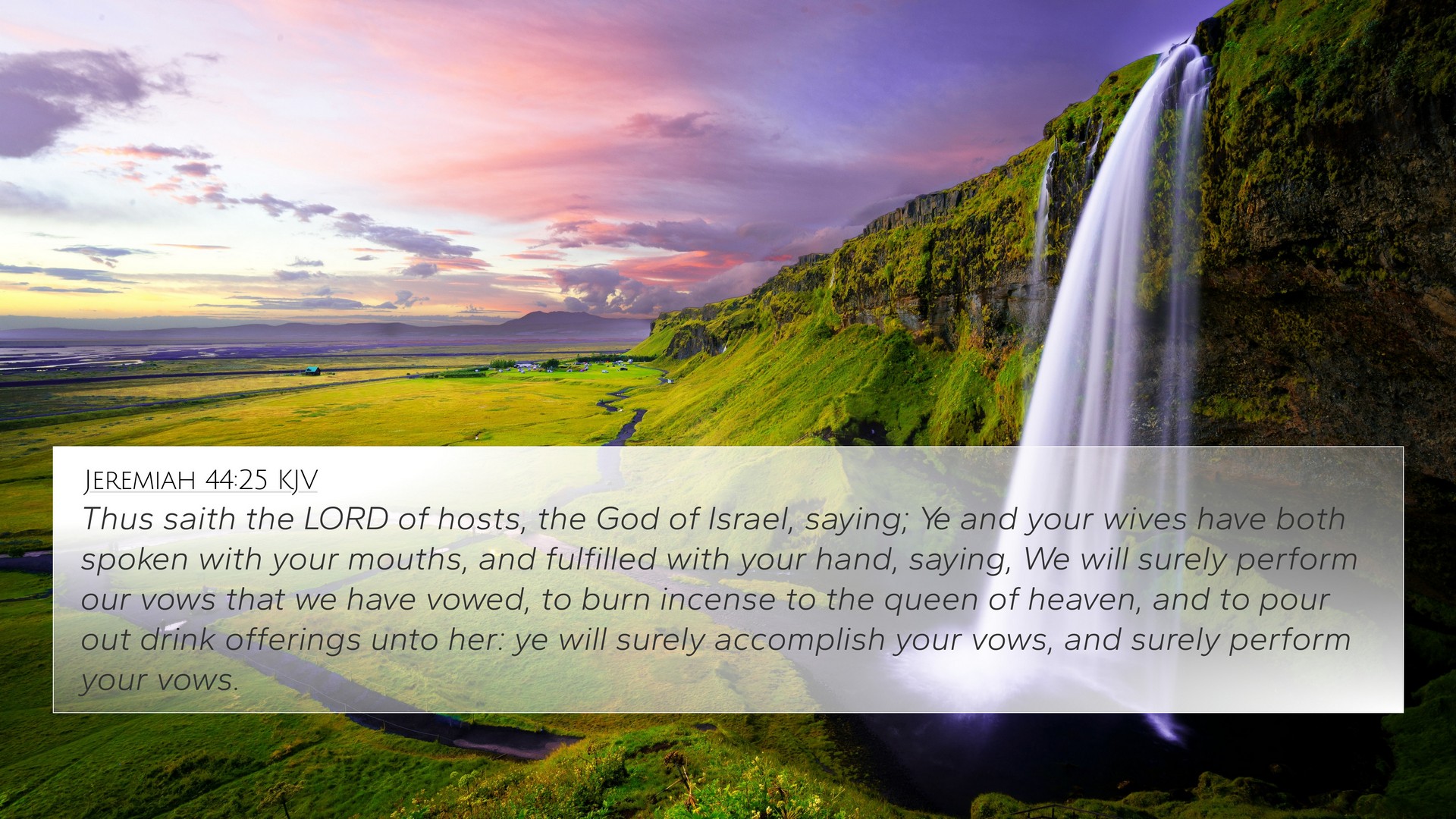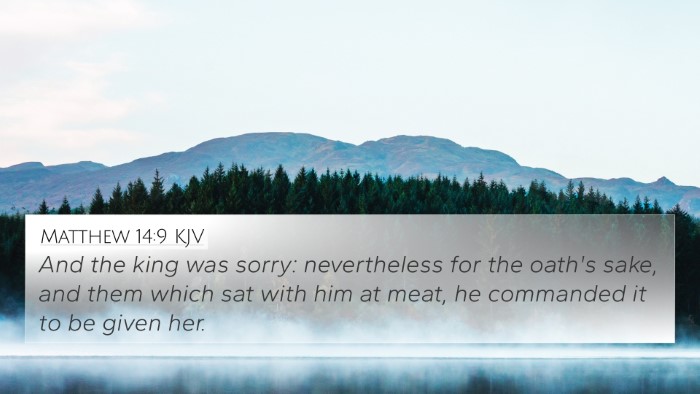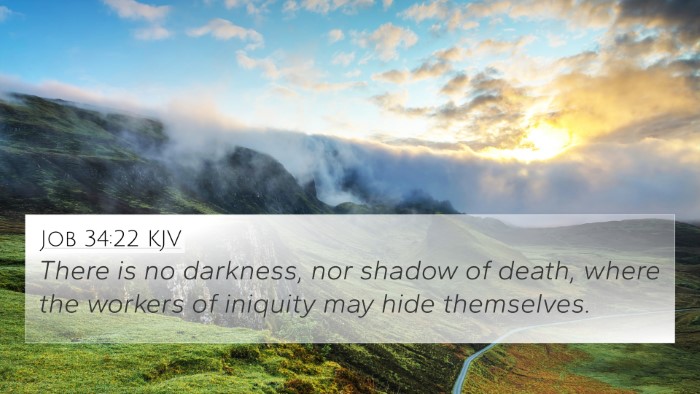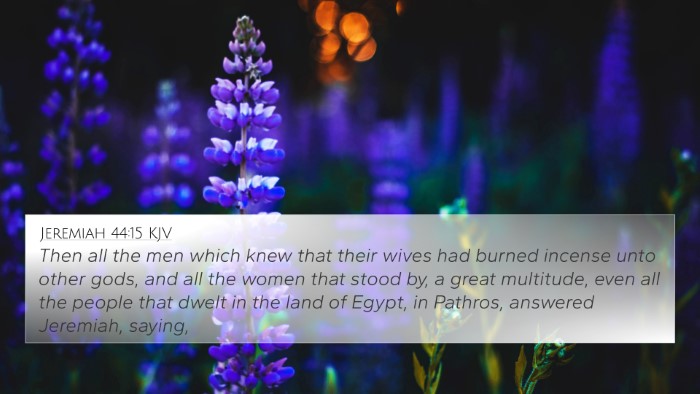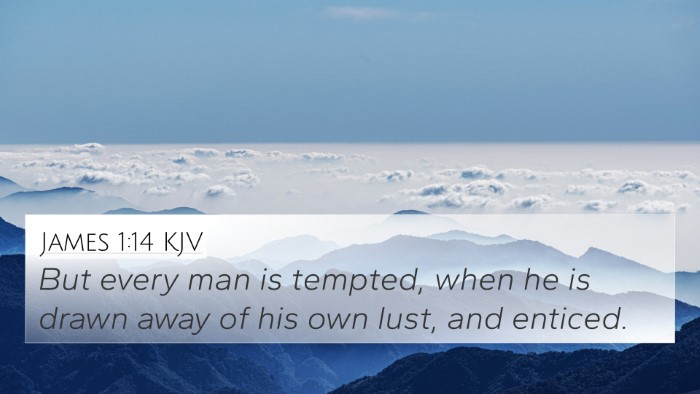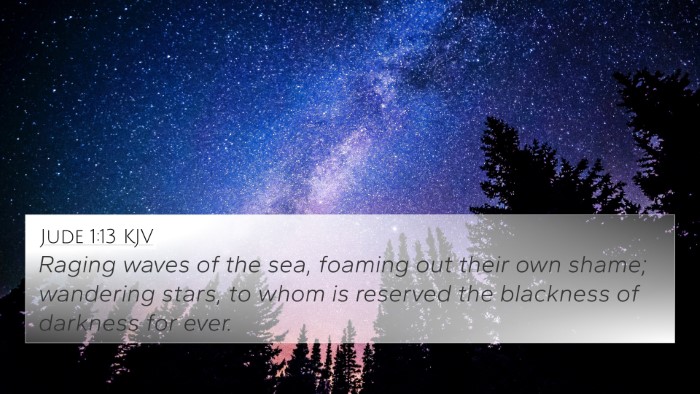Understanding Jeremiah 44:25
Jeremiah 44:25 states, "Thus saith the Lord of hosts, the God of Israel, saying: Ye and your wives have both spoken with your mouths, and fulfilled with your hand, saying, We will surely perform our vows that we have vowed, to burn incense to the queen of heaven, and to pour out drink offerings unto her: Ye will surely accomplish your vows, and surely perform your vows." This verse captures a significant moment in the narrative of the people of Judah, highlighting their commitment to idolatry despite God's warnings through the prophet Jeremiah.
Overview of Commentary Insights
-
Matthew Henry's Commentary:
Matthew Henry observes that this declaration from God exposes the stubbornness and rebellion of the people against divine instruction. They openly defy God's authority by choosing to continue worshipping the "queen of heaven," revealing their infidelity and disregard for the covenant made with God. Henry emphasizes the consequences of their actions and suggests that this verse serves as a poignant warning against idolatry.
-
Albert Barnes' Notes:
Barnes highlights the significance of the vows made by the people, noting that their commitment to burning incense to the "queen of heaven" signifies a deep-seated cultural practice that they refuse to abandon. He points out that their actions reflect a misplaced sense of security in rituals rather than reliance on God's sovereign will. This commentary encourages readers to reflect on the authenticity of their own commitments to God.
-
Adam Clarke's Commentary:
Adam Clarke underscores the people's blatant rebellion as they directly contradict God’s commands. He elaborates on the term "queen of heaven," suggesting that this could represent various goddesses worshiped in the ancient Near East. Clarke’s commentary illustrates the depth of Israel's unfaithfulness and the dangers of cultural syncretism—integrating idol worship with their faith in the God of Israel.
Bible Verse Cross-References
Understanding Jeremiah 44:25 is enhanced through various Bible verse cross-references that illuminate themes of idolatry, rebellion, and divine judgment. The following verses are particularly relevant:
- Exodus 20:3-5: "Thou shalt have no other gods before me. Thou shalt not make unto thee any graven image..." This passage emphasizes God's command against idolatry.
- Jeremiah 7:18: "The children gather wood, and the fathers kindle the fire, and the women knead their dough, to make cakes to the queen of heaven..." Reflects the same idolatrous worship mentioned in Jeremiah 44:25.
- Isaiah 44:9-20: Discusses the futility of idol-making and the folly of those who worship man-made gods.
- Ezekiel 14:3: God challenges the elders of Israel about their idolatry, showing that He will not be consulted by those who have other gods.
- Hosea 4:12: "My people ask counsel at their stocks, and their staff declareth unto them..." highlights the people's reliance on false idols.
- Romans 1:21-23: Paul writes of those who exchanged the glory of God for images resembling human beings and animals, paralleling Israel's transgressions.
- 1 Corinthians 10:14: "Wherefore, my dearly beloved, flee from idolatry," serves as a New Testament exhortation against idolatry.
Thematic Bible Verse Connections
The connections between Bible verses extend our understanding of overarching themes in scripture. For example, the theme of idolatry runs consistently throughout both the Old and New Testaments. By cross-referencing these texts, we can observe how the warnings and teachings about false worship apply to believers today.
Implications for Modern Believers
Readers are urged to reflect on their commitments and the potential distractions that may lead them away from honoring God. Understanding Jeremiah 44:25 through the lens of various commentaries and cross-references provides a comprehensive view of the dangers of idolatry, both in ancient contexts and contemporary faith practices.
Conclusion: Engaging with Scripture
Engaging with Bible verses like Jeremiah 44:25 through comparative Bible verse analysis and thematic connections fosters a deeper understanding of the complexities of faith and the human inclination toward idolatry. Utilizing tools for Bible cross-referencing enables believers to create a comprehensive dialogue across scriptures, enriching their spiritual journey.
